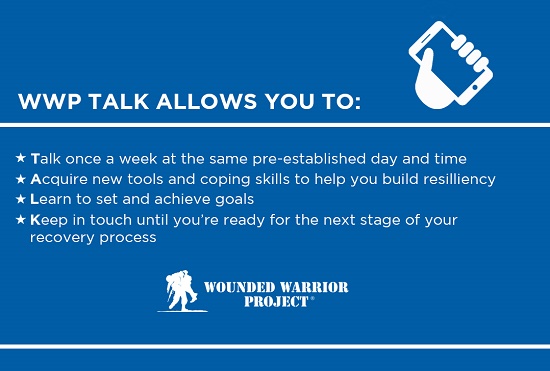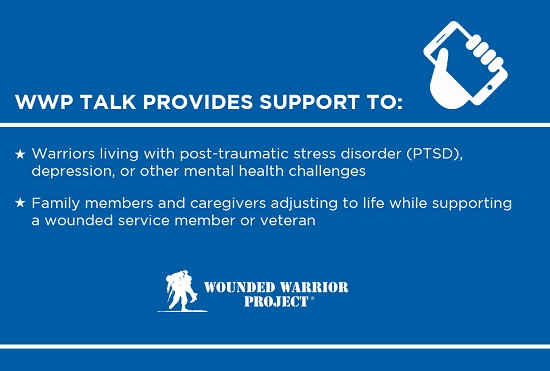Wounded Warrior Project Identifies 4 Benefits of Telephonic Emotional Support


WWP Talk is a mental health support line that is an invaluable, non-clinical form of emotional support for warriors, family members, and caregivers.
By Mike Richardson, Wounded Warrior Project mental health and independence services vice president
JACKSONVILLE, Fla. (March 27, 2017) – With more than 2.4 million service members having deployed as part of the Global War on Terrorism, the number of warriors returning home with invisible injuries is staggering at an estimated 400,000. Those living with invisible wounds of war, including combat stress, depression, and post-traumatic stress disorder (PTSD), tend to isolate themselves to avoid triggers. But seclusion only heightens the issues, leading to feelings of defeat, destruction, and destitution – all of which obstruct the road to recovery.
Wounded Warrior Project® (WWP) recently launched one of its highly popular pilot programs, WWP Talk. It serves as a mental health support line that is an invaluable, non-clinical form of emotional support for warriors, family members, and caregivers. The program has been a lifeline to more than 2,500 participants to date, with 92 percent reporting satisfaction with the program in 2016 alone.
“All too frequently, isolation can lead to the tragedy of veteran suicide,” said Ryan Kules, WWP mental health director. “What warriors desperately need is just one person who can be there for them consistently to provide that first step in reconnecting to life and gaining a sense of empowerment. This is why Wounded Warrior Project’s mental health support line is crucial – and why it’s been so successful.”
Here are four benefits to telephonic emotional support:
Accessibility – People who seek phone assistance can enjoy its ease of access. It eliminates challenges with getting out of the house, such as geographical distance from a mental health care provider and mobility limitations.
Lack of Stigma – Many people shy away from asking for mental health care due to the stigma associated with it. And to some, looking for help means acknowledging failure or defeat. However, the phone is typically seen as a less threatening option, so these interactions are more comfortable.
Privacy – Talking on the phone allows much more privacy for callers than in-person interactions. Since the phone enables warriors to get help while maintaining a certain degree of anonymity, it’s easier to open up. Callers can make careful initial steps without having to commit or to confront their fears and inhibitions.
Cost – Phone assistance does not come with the price tag associated with traveling: gas costs, taking time off work, etc. It also doesn’t cost a lot emotionally, meaning it isn’t as big of a commitment to answer a phone call as other forms of support. This is a good entry point for warriors to start healing.
Through the generous support of donors, WWP’s mental health support line is available at no cost to warriors, family members, and caregivers registered with WWP. It serves as a stepping stone in the recovery process for many of them.
To register or learn more about the support line, call the Resource Center at 888.WWP.ALUM (997.2586). To learn and see more about how WWP connects, serves, and empowers wounded warriors, visit http://newsroom.woundedwarriorproject.org/.
About Wounded Warrior Project
Wounded Warrior Project® (WWP) connects, serves, and empowers wounded warriors. Read more at http://newsroom.woundedwarriorproject.org/about-us.